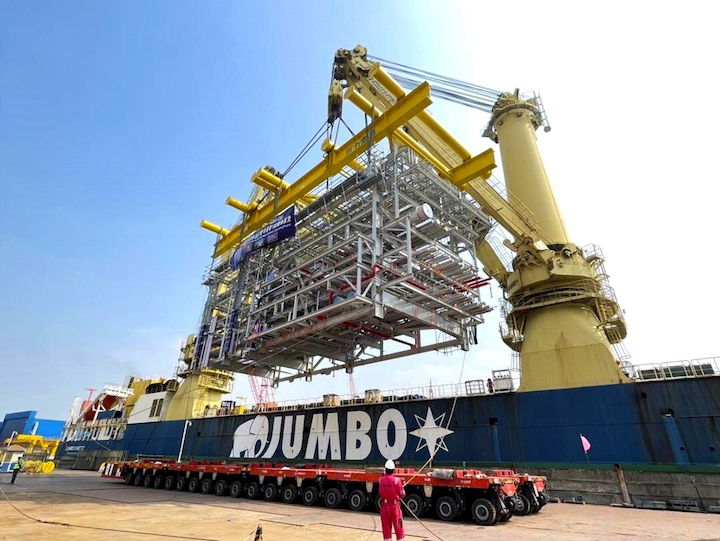On 11 March, MV Svenja discharged her cargo of 9 modules. The discharge marked the completion of the JSI Alliance’s scope of work in the Basrah Refinery Upgrading Project for JGC Corporation. The Alliance’s undertaking of this large-scale, complex logistical project was made possible by its comprehensive approach featuring in-house engineering, project management, QSHE and experienced crew.

Flexible fleet. Adaptive approach.
A number of other vessels from the combined JSI Alliance fleet performed supporting roles in the execution of this significant project, undertaking a series of seven voyages consisting of equipment including seven, 82 m, 800 t bullet tanks. Representing the main logistical scope in the Basrah project, the undertaking has seen JSI transport some 450,000 frts of cargo over a period of twelve months.
By pooling its vessels, the Alliance is able to provide a flexible service, whereby it can ensure the availability of a vessel with the required capabilities, while continuing to support other clients. This has proven to be of considerable value during the Basrah project, allowing the Alliance to swap out modules, using the most suitable vessel for each voyage and avoiding interruptions to the workflow.
At the same time, the Alliance was able to put its vessels to work on other projects in between cargoes, thereby avoiding congestion at the single berth available in Nantong.
Efficiency gains
This was just one of the many steps JSI took to ensure optimal efficiency during the project. Other measures included investing in HPME rigging and increasing the number of crew onboard the vessels.
An additional gain in efficiency was achieved with the development of a straightforward enhancement of the lifting frame. JSI devised a system whereby wooden blocks were added to the lifting beam to create an extension of the guideline. With this, the process of hooking on the modules was sped up in a safe manner.
Based on such measures, the project became increasingly efficient over time, with module transportation rising from one module per day at the outset, to nine modules during a six-day period at its conclusion.
Boosting safety
In addition to supporting the optimisation of efficiency, the close cooperation between the JSI Alliance partners gives a considerable boost to safety. At the end of each voyage, lessons learned were shared between all involved in the execution of the project to be incorporated into the next, with a view to maximising safe practice.
Kiharu Yamashita, Project Logistics Manager of JGC Corporation: “We are very happy with the work undertaken by the JSI Alliance. The Alliance has completed its scope within the timeframe we had anticipated by their fully supporting to our project to dedicate MV Jumbo Kinetic & MV Svenja for whole duration of PJ as well as assigning MV Jumbo Javelin, MV Fairmaster, MV Regine and MV Anna for our important heavy cargo shipments. We were particularly pleased with the smooth communications between all parties and the way in which Jumbo and SAL work together as one. This has undoubtedly made a significant contribution to the safe and efficient manner in which the scope was executed.”
Robert de Waard Project Manager at JSI: “I’d like to offer my gratitude to JGC for their trust in us and for their good cooperation during the project. I’d also like to thank the colleagues and crew for all their hard work over the year; we could not have done it without them. The efficiency gains we made during the project are a testament to their efforts.”
Port captain Mike Ma: “Being one of the main links between the vessel, the office, the client and the stevedores is a privileged position to be in and one I really enjoy. As port captains, we oversee all the elements a total logistics project like this brings together. We anticipate, we adapt, we align and we reap the rewards of a busy project coming to completion and the fulfillment of having another happy client.”
The South Refineries Company, an energy company under the Iraq Ministry of Oil, awarded JGC an EPC contract for the Basrah project. Upon completion, the refinery will help close the gap in supply and demand for petroleum products in the country, reducing import dependency and contributing to job creation and economic development.









